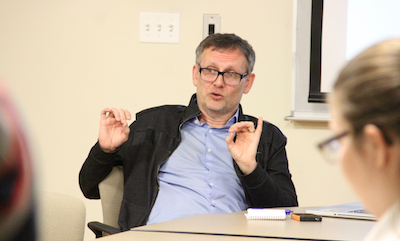Boston Globe Spotlight Editor Discusses Mental Health.
 In murders by, and police killings of, people with mental illnesses in Massachusetts, “there was a clear pattern that emerged fairly quickly,” Boston Globe Spotlight Team Editor Scott Allen said during a visit to the SPH Mental Health-Public Health Connections Interest Group on February 14. “The pattern was untreated mental illness.”
In murders by, and police killings of, people with mental illnesses in Massachusetts, “there was a clear pattern that emerged fairly quickly,” Boston Globe Spotlight Team Editor Scott Allen said during a visit to the SPH Mental Health-Public Health Connections Interest Group on February 14. “The pattern was untreated mental illness.”
Allen was discussing the recent Spotlight series “The Desperate and the Dead,” which was created, he said, to highlight the decades-long decline in mental health services in Massachusetts, and the cost it has had.
“We are so excited Scott agreed to come speak with us,” Juliana Restivo, an MPH student and global health staff member, said in her introduction. Restivo co-organizes Mental Health–Public Health Connections with fellow MPH student Laura Graham. “Through research, advocacy, and access to care, we want to have more conversations surrounding the many aspects of mental health care here at SPH,” Restivo said.
For his part, Allen said he was excited the group reached out. “We really are happy to talk to anybody who wants to talk to us about this,” he said. “The reason we created this Spotlight series was to bring attention to it.
“They’re preventable tragedies,” he said of the 139 murders in 10 years in Massachusetts, and about half of people killed by police in the state. “Massachusetts has closed a higher proportion of its beds than almost any other state,” and slashed the Department of Mental Health’s budget by about half over the last 20 years. Along with a shrinking and fractured mental health system, he said, other issues like police training, lack of adequate community care, and prisons’ management of inmate mental health contribute to these deaths.
“You’re fighting the good fight,” Allen told the assembled students, faculty, and advocates who make up the Mental Health–Public Health Connections Interest Group.
Asked what those in the group could do, Allen said, “The advocacy groups need to get their hands dirty.” He pointed to the more successful and unified efforts to combat the opioid epidemic as a model to follow. He also said the particular challenge of this issue was that there is no “bad guy.”
“The players are well-intentioned,” he said, but the “wreck of a system” incentivizes them to do the wrong things.
As for the Spotlight Team, which is famous for exposing the 2002 child sexual abuse scandal in the Catholic archdiocese of Boston, “We’re not done yet,” Allen said. “We’re going to continue to push on this.” That includes placing pressure on Governor Charlie Baker, lawmakers, and the mental health lobby.
“This is not something you can keep ducking,” Allen said.
Get in touch with the Mental Health–Public Health Connections Interest Group here.